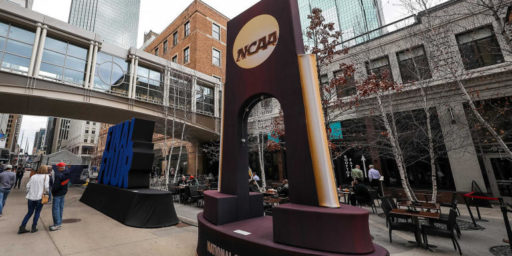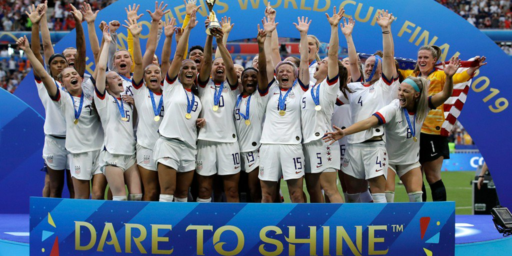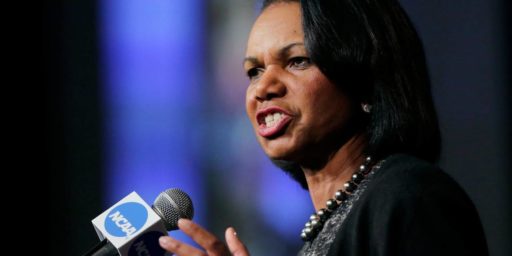In All Likelihood, Your Kid Is Not Going To Be The Next Tim Tebow Or Cliff Lee
Tony Manfred at Business Insider reports on some statistics from the NCAA on the likelihood that a college athlete will become a professional athlete:
Even if your kid is good at sports in high school, gets a scholarship, and excels in college, there’s almost no way they are going to go pro.
Scott Soshnick of Bloomberg tweeted a link today to the NCAA’s official estimated probabilities that athletes in six major sports become professionals.
Only one sport (baseball) had more than 2% of NCAA players go pro.
Here are some of the numbers
- 11.6% of college baseball players play professionally, 0.6% of high school baseball players do
- 1.7% of college football players play professionally, 0.08% of high school football players do
- 1.3% of college ice hockey players play professional, 0.1% of high school ice hockey players do
- 1.2% of men’s college basketball players play professionally, 0.03% of high school men’s basketball players do
- 1.0% of men’s soccer players play professionally, 0.03% of high school soccer players do
- 0.9% of women’s college basketball players play professionally, 0.03% of high school women’s basketball players do
The higher numbers for baseball can be explained largely by the fact that, in addition to Major League Baseball, there are also a large number of minor professional leagues in all parts of the United States. Though the numbers aren’t broken down, I would imagine that the percentage of college baseball players playing for the Major Leagues is about as low as it is for professional football and basketball. Baseball is also unusual in that it was drafting players out of high school, usually into a team’s farm system, long before most other major sports were doing so.
The lesson? Don’t assume little Johnny is going to be set for life just because he’s doing really, really well in Little League.






Arthur Ashe expressed the problem well. In a 60 Minutes interview years ago, he noted that the problem with emphasizing athletics in schools to the degree that we do was that we were training millions of kids each year for about a dozen or so jobs. Mostly, we don’t get it.
Of course, if we did, no one would play the lottery, either.
When I was teaching at Troy State, which was sending almost nobody to the pros at the time, I had several students who were confident that they were going to be professional athletes. Of those, not all were starters at Troy. One wasn’t even an active player.
Just out of curiousity, James, did any of them make it? No names, of course.
For most sports, the college scholarship is not worth it. Outside of football and basketball, colllege athletic scholarships are partial scholarships. Yet, parents spend 1000’s on travel teams, summer camps, and coaching so that their child can compete for a college scholarship.
In addition, playing on a college team limits what a student can major in since the team puts time demands on students that are not possible with some majors.
What good is a degree in recreational sciences or sociology for a college student just so they can be on the swim team or play soccer.
@DRS: Well, none of the ones I’m talking about did. Two at least made some money at the pro level. Al Lucas, who I don’t ever recall saying anything about playing in the pros, made it into the Arena League. Tragically, he died from injuries sustained on the playing field. Another, whose name I don’t recollect, was an undrafted free agent offensive lineman and made it onto someone’s practice squad for a couple of years. I believe he ultimately landed in one of the minor leagues–Arena, Europe, or something.
There have subsequently been some great success stories at Troy, notably DeMarcus Ware and Osi Umenyiora. But that came after Troy moved up to Division IA/FBS.
One might add to this that being in the minor leagues is not, in general, a very enjoyable lifestyle. The difference between being in the majors and the single-A leagues is … well there’s no comparison.
Similarly, someone pointed out that a woman has a better chance of becoming a US congresscritter than a superstar model.
Stick to the books, girls, and don’t drop out of education, no matter what the nice man in the shiny limousine tells you. Even if you don’t take the gold ring you’re likely to at least end up employed at a good job somewhere. Rather than the standard result for washed-up Hollywood wanna-bes…
I’m a soccer ref and the games I work are the second tier high level youth — there are usually several D-1 or D-2 level players on each U-17 team that I work, and it still blows my mind how much money the parents spend on the game. Especially for the kids who are talented enough to get at least a half scholarship for the sport but really don’t care for the game after 10 years of high pressure training and injury rehab. I can’t complain too much as these parents have paid my mortgage more than once, but it blows my mind.
just as a side note, when it comes to hockey, the vast majority of kids with a real shot at a pro career opt to play juniors somewhere, instead of going the college route. the NCAA isnt really viewed as the pipeline that it is in the other big three.